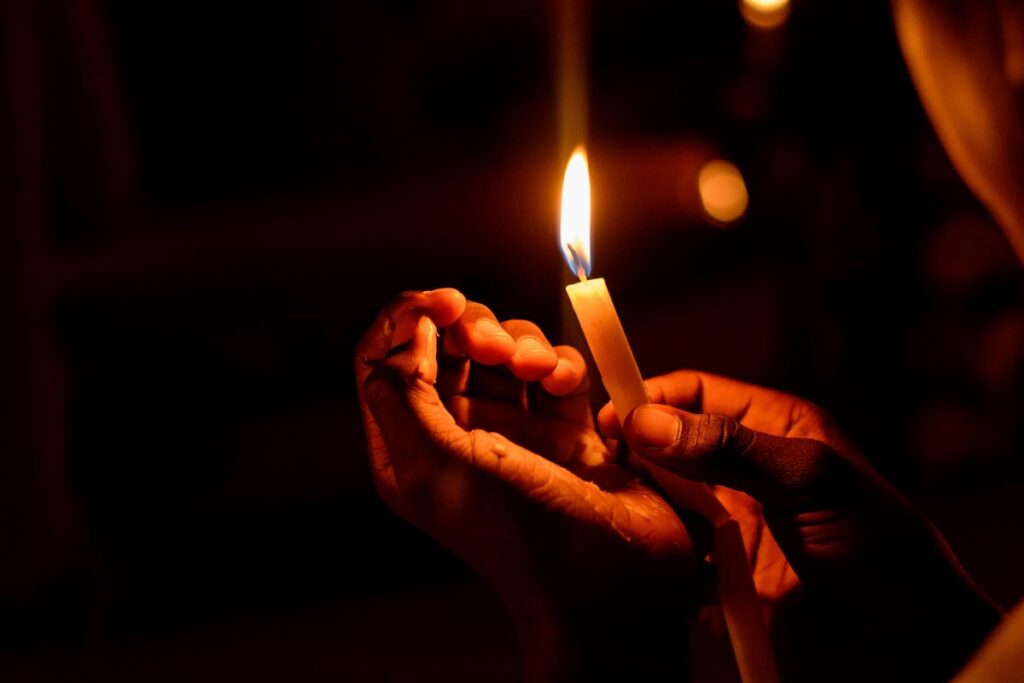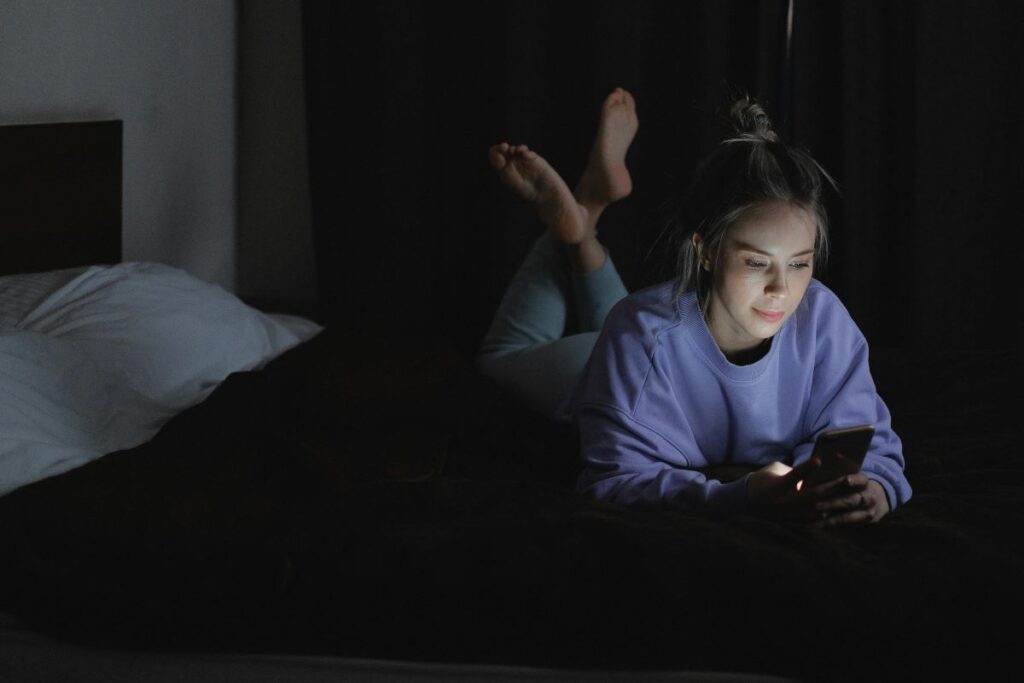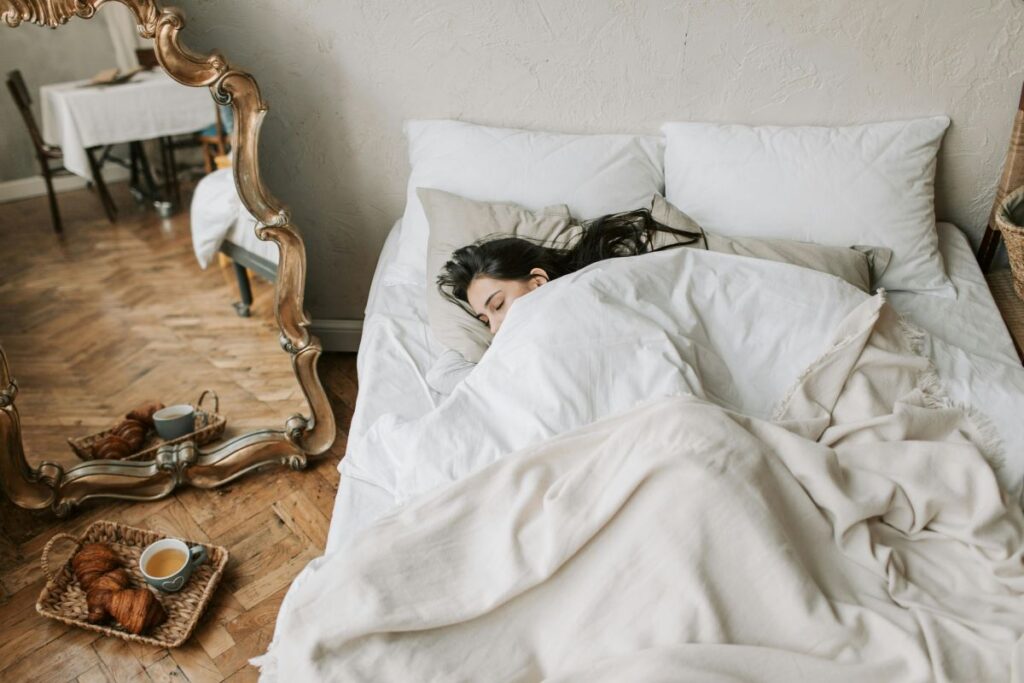There are many reasons why we need to be sleeping in a dark room at night. In this post, I will be outlining the importance of darkness, and the negative effects light has on your body during sleep hours.
This post is for informational and educational purposes only. This post should not be taken as medical advice or used as a substitute for such. We do our best to present the best and most accurate information, however, we are not a licensed medical professional. All information on this Site is from personal experience or opinion, and we are not liable for risk and issues associated with using or acting upon the information on this Site. See Terms & Conditions for further information.

Getting proper sleep is one of the most important things we can do for our health. The sad thing is that most people don’t get enough sleep or get good enough quality sleep.
I think most people have heard that sleeping in the dark is better for our health. And we’ve heard that viewing blue light from screens before bed can negatively impact our sleep.
But do you know why?
Well, to put it simply, when we sleep that’s our body’s time to repair and heal. But our sleep can be affected by choices that we make in our daily lives.
This post is a Beginner’s Guide to Why Sleeping in a Dark Room is Important and how you can start getting better quality sleep tonight.
Light Over the Years
Up until about the end of the Stone Age, humans only ever had natural light sources.
During the day it was from the sun and during the night, the moon, the stars, and sometimes campfire flames.
With no other sources of light available for our ancestors, our circadian rhythm evolved from there.
Our bodies developed over time to wake up with the sunrise and rest when the sunset.
As time went on, humans learned to make wax candles and oil lanterns to have light during the night.
Nowadays we have artificial light, which is where the trouble starts.
Being exposed to artificial light during our regular sleep hours disrupts our body’s natural circadian rhythm which can result in health issues.
These days most people don’t only have a light on in the evening before bed, they also have numerous devices that emit blue light, and these devices have been proven to be even more damaging to our body’s internal clock.
When our body’s internal clock gets out of wack, our body is not receiving the important hours of sleep it needs to repair itself.
This can make us susceptible to illness and disease.

Why Sleeping in the Dark is Important
Most people have heard of the natural chemical melatonin that our body produces that helps us sleep.
Melatonin is produced in the brain’s pineal gland during the night (when it’s dark), and it helps to regulate our body’s sleep/wake cycle, also known as our circadian rhythm.
When our body produces this melatonin during the night, it lowers our body’s blood pressure, glucose levels, and body temperature. Which are all associated with a night of restful sleep.
There is a part of the brain called the Suprachiasmatic Nucleus (SCN for short), which is a group of cells in the hypothalamus (control center of the brain). They control our body’s biological clock, by responding to light and dark signals through the optic nerve in our eyes.
When the eye’s optic nerve senses light it sends a signal to the SCN telling the brain it’s time to wake up (or be awake).
When the brain gets these signals, it responds by increasing the body temperature and starts producing cortisol.
Cortisol is the body’s chemical which when it’s being produced and is high, increases our body’s energy levels, therefore keeping you awake and alert.
Cortisol is low at night which allows our body to sleep, and high during the day, keeping our body awake.
This is usually not a problem.
However, now with all the artificial light available for use during the night hours, our brain receives the signals of light from the optic nerve telling the brain we need to be awake.
When it should be telling the brain we to be getting ready for sleep.
Artificial light unnaturally increases our cortisol levels at night which disrupts our sleep/wake cycle.
No light = no disruption (the body can sleep/recharge optimally)
Even if you don’t have light in your room throughout the entire night while you sleep, a little exposure before bed can shorten melatonin duration by up to 90 minutes. Plus, light exposure during usual sleep hours can suppress melatonin by up to 50%.
That’s a lot!
Before we go to bed a lot of people will use their phones or tablets which expose our eyes to blue light.
Blue light exposure at night prevents our body’s biological clock from figuring out the real-time of day. This can result in potential disease in the body.

Benefits of Dark Room Sleeping
Now that you understand how light during the night hours affects our body and brain, we’ll go over the benefits of sleeping in the dark.
Benefits of Sleeping in the Dark:
- Allows you to fall asleep more easily
- Enhances your health – aids in weight loss
- Decreases risk of diabetes
- Increases mental focus
- Regulates melatonin production
- Relief for eyes
- Protects skin from aging
- Manages hunger
- Decreases depression
There are so many benefits that result from sleeping in the dark and reducing artificial light exposure in the hours before sleeping.
This is all because when we sleep our body and brain recharge and heal.
Without proper sleep, our minds and bodies can start to develop illness and disease.
The importance of sleep for us is immeasurable.
It’s everything.
It’s when our bodies and minds recover from anything that might be starting to cause issues. Sleep is our medicine, and getting proper sleep is extremely important.

Tips for Making Your Room Dark
Now let’s chat about ways you can make your night’s sleep more beneficial by starting with creating a dark room to sleep in.
There are a few things I usually recommend first when trying to get better sleep in a dark room.
Sleep Mask
The easiest option would be to use a sleep mask when you sleep. This immediately blocks out any light that may be sneaking through your window blinds or from any devices emitting light in your room.
Remove Devices From Room
On the same path, you can remove any of those devices that are emitting artificial light in your room, cell phones, iPad’s, TV’s etc.
Taking these things out of the area you sleep in will greatly improve your sleep quality.
Blackout Curtains
Another great thing I like to do is get blackout curtains.
This one is fantastic because it helps to block out light from outdoor streetlights if you live in town, cars that might be driving by, or even moonlight if the moon is bright.
And yes, even moonlight during sleep can disturb your brain’s melatonin production and make you think you need to be awake at this time.
Removing devices from your room during sleep costs nothing and even buying the sleep mask is very inexpensive.
So if you’re looking for a cheap way to get started those two options are fantastic.
If you’d like to invest a bit in your sleep quality, I suggest eventually getting blackout curtains because I personally do find they help a lot.
Now that you know all about the importance of sleeping in a dark room, you can start doing it tonight and give your body the proper rest it needs.




